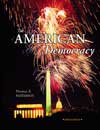This chapter briefly explains the "core" principles of the political culture that have shaped American politics since the country's earliest years and explores the power of those ideals. The chapter's main points are: American political culture centers on a set of core ideals-liberty, equality, self-government, individualism, diversity, and unity-that serve as the people's common bond. Politics is the process that determines how a society will be governed. The play of politics in the United States takes place in the context of democratic procedures, constitutionalism, and capitalism, and involves elements of majority, pluralist, and elite rule. Politics in the United States is characterized by a number of major patterns, including a highly fragmented governing system, a high degree of pluralism, an extraordinary emphasis on individual rights, and a pronounced separation of the political and economic spheres. Although the ideals of American political culture are often inexact and conflicting, they have had a powerful effect on what generations of Americans have tried to achieve politically for themselves and others. For example, the notion of individualism has resulted in the United States spending less on social welfare programs when compared to the nations of Europe. (See Figure 2) The ideals of American political culture also have been a unifying force in a country composed of immigrants from many diverse nations. The chapter describes the concept of a "political system" is described along with five "encompassing" tendencies of American politics-enduring cultural ideals, fragmentation of governing authority, competing interests, stress on individual rights, and sharp separation of political and economic spheres. Politics in the United States takes place within a pattern of both conflict and consensus. Conflict is rooted in scare resources and differing values. The government tries to resolve problems by promoting consensus. Fortunately, the rules governing the political process are generally accepted by the vast majority of Americans-democracy, constitutionalism, and capitalism. Public policies-be they broad or narrowly-based-may be explained according to the majoritarian, pluralist, or elitist model. Finally, the political system is a useful instructional tool. The systemic model is based on demand and support inputs, the institutions of government, and outputs, i.e., binding decisions (public policies) on society. Aside from instructional approaches, the most important question to consider in the American heritage and democratic life is: "What is the relationship of the people to their government"? The remainder of the text should provide you, the student, with an eventual reply to this question. | 



 2001 A McGraw-Hill Online Learning Centre
2001 A McGraw-Hill Online Learning Centre